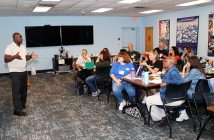
Honoree John Mooney celebrates with his family at the Honoring Heroes Reception. From left, Marianne Mooney, Kayla Mooney, John Mooney and J.R. Mooney.
LONG BEACH — CSEA activists devote countless hours of their time to championing the rights of their brothers and sisters in unionism.
One such member is City of Long Beach Unit President John Mooney, who was recently honored for his union activism by Hofstra University’s Maurice A. Deane School of Law’s Center for Children, Families and the Law and the Gitenstein Institute For Health Law and Policy at their Honoring Heroes event.
Mooney, along with other Long Island and New York City area labor leaders, was honored for his ability to advocate for his union brothers and sisters, while working in unison with City of Long Beach officials during contract negotiations.
He has also helped to grow CSEA by organizing the Long Beach Housing Authority. Furthermore, he effectively led unit members during the restoration of the infrastructure of the City of Long Beach after Superstorm Sandy devastated the area.
The Long Island Reporter sat down with Mooney to discuss his commendation and why he’ll Never Quit on CSEA.
Long Island Reporter (LIR): How did you feel when you found out you were being honored?
John Mooney (JM): I was shocked. I accepted that award alongside a veteran who did three tours in Iraq and an officer that was paralyzed in the line of duty. It was really humbling to be there and it inspires me to fight harder.
LIR: What do you think is important about being an activist?
JM: Fighting for workers is more important than anything. There were three wrongful termination cases that were mentioned during the ceremony. One guy was out four years, another was out three years and a third worker was out for a year. The unit board and I were successful in getting their jobs back. Activists are the voice for the voiceless.
LIR: What inspired you to become an activist?
JM: I used to watch (Long Island Region President) Nick LaMorte and (Nassau Municipal Employees Local President) John Shepherd at some of their rallies when I was younger. I really liked what they had to say. After that, I decided to get more involved as a shop steward, then as an officer and eventually, I ran for unit president.
LIR: What motivates you to stay involved?
JM: The members. It’s rewarding to make people believers in CSEA who were nonbelievers before. Some people don’t believe they’ll ever get a promotion or a raise. It may take a while, but we’ve been able to get that for them. To see their reactions is rewarding. That, to me, is worth it all.
LIR: What is your proudest moment in your career as an activist?
JM: I would say winning the three wrongful termination cases and the six-year contracts that I helped negotiate in 2009 to get members salary increases.
LIR: What advice would you give to a potential activist who is on the fence about getting involved?
JM: You have to get involved because you have to have a seat at the bargaining table. One thing I’ve noticed is that if you’re not involved and you don’t stay vigilant, management will walk all over you.
LIR: You’re able to pack Long Beach Town Hall for unit member meetings. How are you able to do that?
JM: My biggest thing, before I even got involved in the union, is communication. We do text message, email and Facebook. I’m very blunt with members about what’s going on and sometimes they don’t like that, but they respect it. My relationship with our unit members is something I’ve been building since 2009. People know that when I speak, I’ll back up what I say.
LIR: How important do you think your presence on social media is to connecting with unit members?
JM: It’s so much easier to send a message out now than it was when I started. Now, I can go on Facebook and post something that 150 people will see within a minute. It was a lot harder years ago when you had to pick up the phone and call them. People can’t say that they don’t know about what’s going on when I sent them a text or posted on social media.The information is right there. Modern technology provides great resources that all unit and local officers should use.
LIR: How important do you think the feeling of unity and solidarity amongst unit members impacts how effective you are as a unit president?
JM: It goes hand in hand. If I don’t produce for the members, they won’t be happy. When I first became part of CSEA, I didn’t think anyone was fighting for me. Our members know I’m fighting for them. They see the cases that we’ve successfully won and they know that it’s all a product of hard work.
LIR: How do you manage relationships with members who don’t think they have to follow protocol when addressing issues?
JM: Some members want to go around you and deal with issues themselves, but I don’t take it personally. They pay dues, so they have the right. Some people will be upset no matter what you do. I just focus on the positive and stay the course. I still feel the same way about being an activist that I did 11 years ago when I first got involved. I still love it. The personal reward you get when you win a grievance or get someone an increase is something you can’t put a price on.




